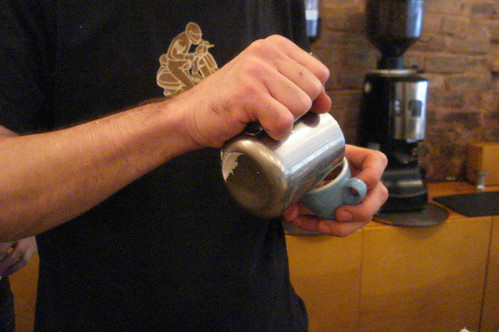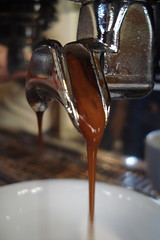
(Photo of Ed Kaufmann from two years ago—wowza!)
This interesting-slash–maybe kind of sad piece about whether or not bartending school is a waste of time, from today's Serious Eats, got me to thinking about my own job, and about people all over who do similar work in coffee (not because I think it's a waste of time, though—just keep reading).
How is a really good barista made? Can someone truly be taught to be good at this? What makes a good barista good?
It's a blessing and a curse to have the opportunity to think about these things all the time, not only when dealing with brand-new baristas but also when dealing with brand-new or prospective café owners. How do you take someone's (sometimes cursory) interest in coffee and help them mold it into a genuine dedication to a craft and a culinary art? I always tell employers to hire on personality and teach the rest, but is that really true?
These thoughts were compounded by the fact that today one of my trainees turned to me after I pulled a shot and asked, "Has anyone you've ever trained become as good as you are?"
At first, I didn't know how to answer—partially because I know it was likely just a little bit of teacher worship, partially because I am very shy, and partially because I was almost afraid of what my response might be. But after I thought about it for an awkward 20 seconds, I finally said, "I wasn't trained to be this good, per se; but I have been and am currently being trained very well and I wanted to learn even more, so I do everything in my power to accomplish that, all the time. I can probably teach you more than you know right now, but I can't necessarily teach you to want to learn and do more. And that's what makes somebody really good at this."
I think that's the G-d's truth. I want the baristas I work with to come away from our time with a more specific and more in-depth understanding of what they're doing. I want them to walk out of the training center knowing how to taste coffee, and how tiny pre-extraction details affect the finished cup. I can teach somebody how to do this, strictly speaking, but I can't teach someone how to feel the coffee in their bones, and that's the heart of the matter (to quote the poet Don Henley).
It's true that nothing shows you to work quickly and efficiently behind a bar better than simply working quickly and efficiently behind a bar—or, better yet, working slowly and inefficiently and realizing over time (and hopefully with some guidance) what needs to be improved on and how.
In this sense, I believe in working in real bar environments as often as possible if you're going to train people to be in coffee, because I think it makes one a better barista, which in turn makes one a better teacher (perhaps I got this idea from my alma mater?). Actually occasionally working at a busy café puts you on the same level as the folks you're responsible for training; it lets you speak their body language a little more and, and lets them feel like you're in the trenches alongside them; it lets you explain the real-time trials and tribulations they'll face (e.g. burning the same hand about a hundred times in a row, like I always do as soon as I step back behind an espresso machine for service for the first time in a while).
One important part of this is having humility—especially on the teacher's part. If a teacher can't realize that theirs isn't the only way to do something he or she is doing everybody a disservice. But the teacher can only teach; they can't force the student to look outside that box.
Do I think that the classroom environment is inappropriate for training? Heck no!(!!!!) I see the lessons and the education I have the chance to provide in the CCC NYC training center every day as an incredibly valuable part of the professional relationship I have with all my customers, and I see baristas who go through our programs get better and better every day because of it. But I also think there's no replacement for being challenged in an environment that comes with a little pressure, and for being forced to keep an open mind and realize that this is an adaptable and practical craft as much as an artistic and culinary one—that the classroom is one thing and the floor is quite another, but quality is quality and good taste is good taste no matter what the situation.
The element of pressure is absolutely pivotal for advancement, and that's what seems to be lacking in something like bartending school. That and, apparently, fresh lime juice.
But does it taste good??
9/9/09
Nature, nurture, bartending school?
Posted by
Meister
at
7:44 PM
![]()

